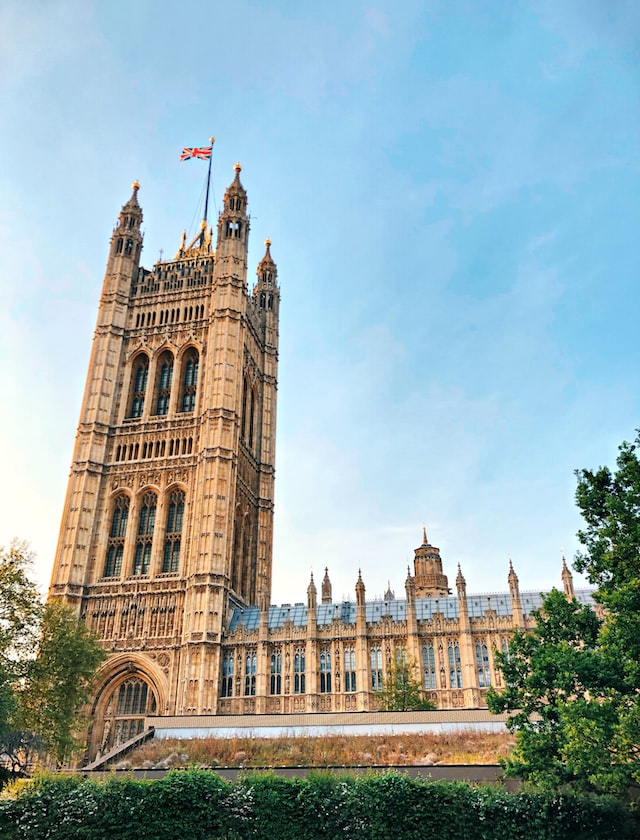About UK
The United Kingdom, also called the U.K., consists of a group of islands off the northwest coast of Europe. It is a unique country made up of four nations: England, Wales, Scotland, and Northern Ireland. England, Wales, and Scotland also make up Great Britain.


Why Study in the UK
Multicultural Country
Great Britain is a multicultural English-speaking country where there is a big opportunity to learn fundamental English with knowing unique multicultural people.
Global Leader
Global Leader in International Education has a high standard of education with a great international academic reputation.
World-leading Research Facility
Access to a world-leading research facility with a world-recognized institution.
World-recognized Universities
There are so many world-recognized universities that have many choices of study levels, degrees, and courses.
World Job Market
After successfully gaining a degree from the UK, you are a valued candidate for the world job market.
For all classes of Race, Religion, and Colour
The UK is one of the best places in the world for all classes of race, religion, and colour where you can live, work and study in the native environment.
Brilliant Work Opportunity
There is a brilliant work opportunity, students are allowed to work 20 hours a week in term time and allowed to work full-time in terms of vacation. Post Study Work opportunity is available after the successful completion of a degree.
Different types of Visa Categories
There is a facility for switching different types of visa categories.
Could be a valued Great Britain citizen in the future
By obeying the existing law and rules you could be a valued Great Britain citizen in the future. We Atlantis Global Network is here to guide you further.
Application Process
The UK has always been one of the best destinations for international students. Besides education, the UK has a long historic customs, culture, lifestyle, and overall elegance that attract students worldwide. We, Atlantis Global Network, divide your plan to study in the UK education into three different stages:
-
Admission Stage
-
Visa Stage
-
Travel/Entry Clearance Stage
Each institute sets its own entry requirements. An application is normally assessed by its current level of qualification. To meet all the admissions requirements for the course you are applying for, the best option is to contact the International Office at the institution you are applying to or contact our expert team who can assist you 24 hours a day. The main intake offered by all Universities is September/October few universities offer January/February intake also.
Some of the commonly required admission documents are:
- Scanned copy of candidate’s passport.
- All academic certificates and transcripts.
- English proficiency certificate.
- Statement of purpose.
- Curriculum Vitae (CV)
- Reference letter from teacher and employer if applicable.
- Job experience letter if applicable.
- Other supporting documents if required.
The UK government provides myriads of opportunities to international students to study in the country. If you want to be part of the outstanding education & opportunities, the UK is one of the best choices. After admission, the first thing you need is a visa. The supporting documents are submitted online following the completion of the online visa application form. Please make sure that all documents submitted for the UK visa application must be scanned of the original.
Some common visa requirements:
- Completing the visa application form online.
- Appropriate visa application fee
- Immigration Health Surcharge (IHS) yearly £470.00.
- Confirmation of Acceptance for Studies (CAS) from your sponsor (University)
- All educational certificates and transcripts.
- English Proficiency Certificate
- Tuberculosis Test – IOM
- Bank statement for at least 28 days with a balance of 12,006 plus unpaid tuition fees for London City and a balance of 9,207 plus unpaid tuition fees for outer London.
- Balance confirmation or solvency letter from the issuing bank.
- Statement of Purpose.
- Job experience letter (if required)
- Other supporting documents if required.
Points required to obtain a student visa- you must have to score 50 out of 50 points. Confirmation of Acceptance for Studies (CAS) Letter – 30 Points + Maintenance (Funds) – 10 points + English Language – 10 points. There are no mandatory requirements to show the sources of income, but you may have to provide financial stability documents if High Commission asks for them.
After admission and visa, never think you have done the job. You still need to make a travel arrangement. Keep all the documents that have been submitted to the UK high commission and bring them with you on travelling. In most cases, UK Border Agency asks you some common questions regarding your course, university, and accommodation. If you fail to answer that you will be in trouble but no worries, we Atlantis Global Network are here to help.
Course
-
Overview
-
Foundation Course
-
Undergraduate
-
Postgraduate
-
Professional Course
-
PhD
Many students across the world pursue higher education in the United Kingdom. Before planning to study in the UK, a student needs to consider some key points:
- Find out admission criteria, especially academic and language requirement
- Select an appropriate course and overall ranking with an academic reputation
- Career path and opportunities
- Tuition fees
- Scholarships offered by the universities
- Other facilities offered by the university
- Look at the university course overview
- Check learning methods and assessment system
- View the course module and assessment system
- Spot the critical areas
- Find out about Professional accreditation
- Review Graduate employability and student satisfaction rate
- Value of money
- Find the best university for your field of study
- University location
An international student must meet the specific entry requirements for desired educational level, if for any reason s/he is unable to meet the entry requirement, the foundation course prepares the student for entering a specific degree program. The foundation course helps a student to understand the curriculum and academic content of the university. At the same time, it will increase language and it will also fulfill the communication gap.
For the foundation course, we should not mention any specific criteria as an entry requirement.
Some important key points to understand the foundation course:
- Foundation Course duration is normally 8 to 12 months.
- Foundation Course cost- £6000-£12000 (Approximately)
- Living costs- £12,006.00 in London and £9,207.00 in outer London.
- IELTS score 4.5+ or equivalent to any English language Certificate (it varies from university to university)
- Can apply for a foundation course in undergraduate or postgraduate in advanced.
- Not too long study gaps are allowed.
An undergraduate degree is an academic casual term for an educational level. An undergraduate degree is often referred to as a bachelor’s degree. It is the first level of university studies a student would apply to from high school and normally takes three to four years to complete. Bachelor of Arts, Bachelor of Business Studies, and Bachelor of Science are three common degrees. In the United Kingdom, it is usually offered at an institution of higher education, such as a college or university.
The most interested and common degrees for undergraduates are:
- Art, Media, and Design
- Business studies (economics, management)
- Classical history
- Computer Science
- Engineering
- English (Literature, etc)
- Environmental science
- Humanities
- Health Science
- Law
- Mathematics
- Medical fields/pre-medical fields
- Music and arts
- Philosophy
- Politics and international relations
- Social work
- Social sciences
- Sciences (earth sciences, biology, chemistry)
- Theology and Religion
Some important key points about the undergraduate course:
- Undergraduate course duration is normally 3 to 4 years
- Undergraduate course tuition fee is £12000 – £14,000 per year on average or more depending on the university.
- Living costs- £12,006.00 in London and £9,207.00 in outer London.
- IELTS score 6.00 or equivalent to any English language Certificate (it varies from university to university)
- Maximum 2 years study gap is allowed to enter an undergraduate degree course. In some exceptional cases, more study gaps may be considered.
If you wish to start a postgraduate program, you must ensure the successful completion of a 3/4-years undergraduate course. Earning an undergraduate degree is a big achievement in your academic journey, but it is not the end of your academic life. Most of the students continue to take a postgraduate degree as further education. It is referred to as an advanced degree which includes a Master’s Degree and Doctoral Degree.
There is a wide range of postgraduate programs at the university level, the most popular ones are:
- Accounting
- Applied Accounting
- Management
- Marketing
- Business Administration
- Brand Management
- Finance, BBA
- International Business
- Project Management
- Tourism
- Hotel Management
- Hospitality
- Sales & Marketing
- Computer Science and Engineering
- Electrical
- Biotechnology
- Computer Animation and Games Technology
- Software Engineering
- Civil
- Mechanical
- Telecommunications
- Mathematics
- Physics
- Human Resource Management
- International Relations
- Journalism
- Law
- Social Work
- Sociology
- Nursing
- Pharmacology
- Psychology ETC
To better understand, and choose your next postgraduate program, talk to our expert support team.
Professional Courses have a great impact on the job market. Professional skills prepare the students or employees with practical knowledge in specific fields and demandable candidate in job markets. It helps them to perform a good role in their professional life in their carrier in the future. Many colleges and universities offer Professional courses for enhancing professional development.
Popular professional courses in the UK:
- Barrister Training Course (BTC); also known as the Barrister-at-Law course
- Association of Chartered Certified Accountants (ACCA)
- British Institute of Facilities Management (BIFM)
- Chartered Institute of Management Accountants (CIMA)
- Confederation of Tourism and Hospitality (CTH)
- Digital Marketing (DG)
- Computer Science in Cyber Security (CSCS)
- BCS – The Chartered Institute for IT
- British Pharmacological Society (BPS) and many more.
The PhD also known as the Doctor of Philosophy, is a research degree, which is one of the most common type of a doctoral degree and is awarded to graduates in many different fields. A PhD lies within the doctorate category, so one is not better than the other. A PhD program will train a candidate to think like a researcher and approach problem-solving in new and different ways. Different types of doctorate degrees:
- Doctor of Philosophy (PhD)
- Doctor of Business Administration (DBA)
- Doctor of Education (EdD)
- Doctor of Theology (ThD)
- Doctor of Medicine (MD)
- Doctor of Optometry (OD)
- Doctor of Psychology (PsyD)
- Juris Doctor (JD)
College education serves as the foundation for a professional future, but a doctorate degree is a big commitment. Successful completion of this program by itself does not lead to licensure or certification in any state, regardless of concentration or specialization. Before you make the decision, arm yourself with as much information as possible and contact our expert team 24 hours a day.
Find UK Universities
- University Profile: Official Website
- Location: Bell St, Dundee DD1 1HG, UK
- Specialized In: Accounting, Business studies, Computer games, Cyber security, Food & Nutrition
- Application Fees: N/A
- Scholarship: Scholarship Page
- English Proficiency: https://www.abertay.ac.uk/international/english-language-requirements/
- University Profile: Official Website
- Location: Penglais, Aberystwyth SY23 3FL, UK
- Specialized In: Art & Design, Business & Management Studies, Economics
- Application Fees: £13-£24
- Scholarship: Scholarship Page
- English Proficiency: IELTS 6.0 with minimum 5.5 in each component
- Required GPA: GPA of 2.5-2.7 (depending on subject to be studied)
- University Profile: Official Website
- Location: 16 Bromell's Rd, London, SW4 0BG
- Specialized In: music, commerce and creativity.
- Application Fees: 1694 USD for both Undergraduate & Graduate programmes.
- Scholarship: Scholarship Page
- English Proficiency: For those who are not from the UK, you will be required to submit proof of EU Citizenship and Proof of English Language Proficiency.
- Required GPA: 2 A-Levels at C grade or equivalent Level 3 qualification (64 UCAS points on the 2017 tariff, 160 UCAS points on the 2016 tariff).
- University Profile: Official Website
- Location: Accrington & Rossendale College, Sandy Ln, Accrington BB5 2AR, United Kingdom
- Specialized In: Business, Finance & Law, Construction, Engineering
- Application Fees: https://www.academiccourse.co.uk/universities/UK/Accrington-and-Rossendale-College/
- Scholarship: Scholarship Page
- English Proficiency: https://www.academiccourse.co.uk/universities/UK/Accrington-and-Rossendale-College/
- Required GPA: Students who wish to study A Levels are required to have a minimum of two 5s and three 4s at GCSE including Grade 4 or above in Maths and English Language.
- University Profile: Official Website
- Location: Cambridge, Chelmsford, London, And Peterborough
- Specialized In: Business, Computer Science, Engineering, Education and Law.
- Scholarship: Scholarship Page
Arts University Bournemouth
- University Profile: Official Website
- Location: Wallisdown, Poole
- Specialized In: Arts, Design, Performance, and Media.
- Scholarship: Scholarship Page
Aston University
- University Profile: Official Website
- Location: Birmingham, United Kingdom
- Specialized In: Business, Employability, Work Placements
- Scholarship: Scholarship Page
Bangor University
- University Profile: Official Website
- Location: Bangor, Wales
- Specialized In: Arts, business media education
- Scholarship: Scholarship Page
- University Profile: Official Website
- Location: 610 W 112th St, New York, NY 10025, USA
- Specialized In: English, Mathematics, Science
- Application Fees: $65
- Scholarship: Scholarship Page
- English Proficiency: A score of 100 or higher on the internet-based TOEFL or a score of 7 or higher on the IELTS.
- Required GPA: 3.0 GPA or higher.
Birkbeck, University of London
- University Profile: Official Website
- Location: Stratford, London
- Specialized In: Business, Employability, Work Placements
- Scholarship: Scholarship Page
Birmingham City University
- University Profile: Official Website
- Location: Birmingham
- Specialized In: Arts, business and computer science
- Scholarship: Scholarship Page
BPP University
- University Profile: Official Website
- Location: London, Abingdon, Birmingham, Bristol, Cambridge, Leeds, Liverpool, And Manchester
- Specialized In: Business, Law Courses
- Scholarship: Scholarship Page
Brunel University London
- University Profile: Official Website
- Location: Kingston, London, England
- Specialized In: Engineering, Health & Medicine, Business, Creative Arts.
- Scholarship: Scholarship Page
Canterbury Christ Church University
- University Profile: Official Website
- Location: Canterbury, England
- Specialized In: Teaching, Social Care, Policing
- Scholarship: Scholarship Page
Cardiff Metropolitan University
- University Profile: Official Website
- Location: Cardiff, Wales
- Specialized In: Arts, Sport, Business
- Scholarship: Scholarship Page
Coventry University
- University Profile: Official Website
- Location: Coventry, UK
- Specialized In: International Experience, Automotive Courses, Engineering, Business Studies, Health And Life Sciences, Art And Design
- Scholarship: Scholarship Page
Cranfield University
- University Profile: Official Website
- Location: Cranfield, England
- Specialized In: Aerospace, Defence, Manufacturing
- Scholarship: Scholarship Page
De Montfort University
- University Profile: Official Website
- Location: Leicester, UK
- Specialized In: Art and Design, business, computing, law, media, healthcare, and engineering.
- Scholarship: Scholarship Page
Hult International Business School
- University Profile: Official Website
- Location: London, England
- Specialized In: MBA, Finance, Marketing
- Scholarship: Scholarship Page
Keele University
- University Profile: Official Website
- Location: Keele, Newcastle ST5 5BG
- Specialized In: Mathematics, Computer Science, Medicine
- Scholarship: Scholarship Page
Kingston University
- University Profile: Official Website
- Location: Kingston, London
- Specialized In: Fashion, Graphic Design, MBA, Journalism, Pharmacy
- Scholarship: Scholarship Page
- University Profile: Official Website
- Location: Kingston, London
- Specialized In: Fashion, Graphic Design, MBA, Journalism, Pharmacy
- Scholarship: Scholarship Page
- University Profile: Official Website
- Location: Liverpool, England
- Specialized In: Sports Science, Engineering, Architecture
- Application Fees: 20 GBP (single choice), 25 GBP (double choice)
- Scholarship: Scholarship Page
- English Proficiency: 1200 (Reasoning) 600 (Three SAT subject tests) for SAT, 26 for ACT, 3 (Three AP exams) for AP
- Required GPA: High School Diploma with a GPA of 3.0 or above on a 4.0 scale (unweighted).
- University Profile: Official Website
- Location: London, England
- Specialized In: Business, Art And Design, Media
- Scholarship: Scholarship Page
- English Proficiency: If you require a student visa you may also need to provide a Secure English Language Test (SELT) such as Academic IELTS or TOEFL iBT.
- Required GPA: Grade Point Average of 2.7 or higher or a minimum C grade average or higher (for non-GPA grading systems)
- University Profile: Official Website
- Location: London, UK
- Specialized In: Engineering, Accounting, Science
- Scholarship: Scholarship Page
- English Proficiency: 6.5 (with no component below 5.5), subject to course.
Scholarship
Scholarships are financial aid awards designed to help students pay for their educational expenses either a college or university. Sometimes a scholarship is one-in-go. Students might receive the money directly as a check in their name or the money is given to the student’s institution. Institutional scholarships are renewable and provide money for students each semester or academic year. All UK scholarships are not offered based on financial need – most of them will evaluate your ability in academics. These awards depend on students’ academic qualifications. A student can apply for scholarships, in terms of applying for the course at the university or after application at any stage.
Scholarships come from a variety of different sources, including clubs, organizations, charities, foundations, businesses, colleges and universities, the government, and individuals.
List for the common scholarships in the UK:
- Anglia Ruskin university– up to 4,000 in different categories.
- Bangor University– Vice-Chancellor Scholarship £4,000- £10,000 (for Year 1) based on merit
- Brunel, University of London– International Excellence and Merit up to £6000
- Coventry University– up to £3000 reduction in tuition fees
- CEG On Campus– up to £2000 reduction in tuition fees
- Coventry University– up to £3000 reduction in tuition fees
- CATS College– Special Scholarships up to 40% Tuition Fees Reduction
- INTO UK-£3,000 to £20,000
- London South Bank University– The International Merit Scholarship is up to £4,000.
- Northumbria University of London– Postgraduate Global Scholarship £2,000 fee discount
- OIEG– Up to £2000 reduction in tuition fees
- QA Higher Education– 20% – 30% on Region & University
- Queen’s University Belfast– Vice Chancellor’s International Scholarship up to 50% off
- Queen Mary University of London– from £1,000-£12,000 for different faculties
- South Asia Excellence Award– up to £7,000 tuition fees reduction in the 1st year
- University of Bedfordshire– up to £1000 reduction in tuition fees
- UWE Bristol– up to £4000 reduction in tuition fees
- University of Essex– Dean’s Award fee discounts between 10% – 100% of tuition fees
- University of Greenwich– International Scholarships Award a tuition fee discount worth up to £3,000
- University of Glasgow– International Scholarships up to £10,000 toward tuition fees
- University of Hertfordshire– Chancellor’s International Scholarship up to £500
- University of Leeds– International Excellence Scholarship up to £10,000
- University of Liverpool– Vice Chancellor’s International Attainment Scholarship £2,500
- University of Nottingham– up to £3000 reduction in tuition fees
- University of Newcastle– Vice-Chancellor’s Global Scholarships up to £4,000
- University of Nottingham– Developing Solutions Scholarships from 30-100%
- University of Nottingham– Business School Merit Scholarships up to 50% for master’s applicants
- University of Reading– up to £4000 reduction in tuition fees
- University of Strathclyde– International Scholarship up to £2,000-£5,000 per year
- University of Sheffield– Undergraduate Merit Scholarship up to 50% off the tuition fee
- University of Strathclyde– Scholarships between up to £7,000
- University of York– Vice-Chancellor’s scholarships up to £10,000 for the highest-achiever
Useful link for the scholarships:
Higher Education Funding Council for England website – http://www.hefce.ac.uk/
The UK Council for International Student Affairs – http://www.ukcisa.org.uk/
The Guardian (UK)’s site on Higher Education- http://www.theguardian.com/education/higher-education
The British Council’s page on Higher Education – http://www.britishcouncil.org/higher-education
Child Education
Students aged between 4 to 17 can apply for a Child student visa in the United Kingdom at an independent school. This is a long-term visa for up to 6 years if you are under 16 and up to 3 years if you are 16 or 17. Usually, you can apply or start processing six months before your course start. It is pretty much like Tier4 general student visa but there are some differences to it. Please contact our team for more details.
Useful link for the scholarships:
- Higher Education Funding Council for England website – http://www.hefce.ac.uk/
- The UK Council for International Student Affairs – http://www.ukcisa.org.uk/
- The Guardian (UK)’s site on Higher Education- http://www.theguardian.com/education/higher-education
- The British Council’s page on Higher Education – http://www.britishcouncil.org/higher-education
Help & Support
If you are an international student and want to complete your UK education, please feel free to contact us for cordial support and suggestions. We will guide you to find the right career path regardless of the place you’re coming from. To receive 24/7 service- contact our dedicated expert team on any of our contact channels, and we will come back with a reply within a reasonable time.
Alternatively, you always can contact us by using the following methods:
- For admission help with advice and guidance: Please contact our local office or send your documents to us- email: admission@atlantisglobalnet.com
- For Contacting University Directly: (find University link, no-5)
- Find the UK approved Bank from Bangladesh: (link)
- Find the UK approved Bank from India: (link)
- Find the UK-approved Bank from Pakistan: (link)
- Find the UK approved Bank from Nepal: (link)
- Find the UK approved Bank from Bhutan:
- Find the UK approved Bank from Nigeria:
- Find the UK approved Bank from Malaysia: (link)
- Find the UK approved Bank from China:
- Find information about Child Student Visa: (Link)
- For Arranging Air tickets and travel arrangements: contact our local office. (Local office link)
- In case of refusal and entry clearance/airport harassment: Please contact our head of the compliance team. (Asraf contact details)
For emergency contact:
email: info@atlantisglobalnet.com
WhatsApp: +44 739 966 3337

